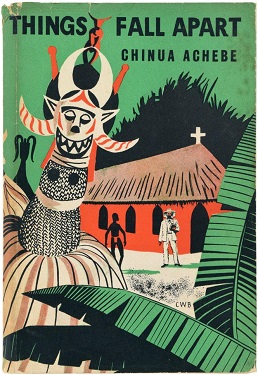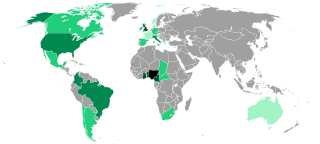Related Research Articles

Igbo is the principal native language cluster of the Igbo people, an ancient ethnicity in the Southeastern part of Nigeria.

Odinani or Odinala, is the traditional cultural belief and practice of the Igbo people of south east Nigeria. These terms, as used here in the Igbo language, are synonymous with the traditional Igbo "religious system" which was not considered separate from the social norms of ancient or traditional Igbo societies. Theocratic in nature, spirituality played a huge role in their everyday lives. Although it has largely been supplanted by Christianity, the indigenous belief system remains in strong effect among the rural and village populations of the Igbo, where it has at times influenced the colonial religions. Odinani is a pantheistic and polytheistic faith, having a strong central deity at its head. All things spring from this deity. Although a pantheon of other gods and spirits, these being Ala, Amadiọha, Anyanwụ, Ekwensu, Ikenga, exists in the belief system, as it does in many other Traditional African religions, the lesser deities prevalent in Odinani serve as helpers or elements of Chukwu, the central deity.

Chinua Achebe was a Nigerian novelist, poet, and critic who is regarded as a central figure of modern African literature. His first novel and magnum opus, Things Fall Apart (1958), occupies a pivotal place in African literature and remains the most widely studied, translated, and read African novel. Along with Things Fall Apart, his No Longer at Ease (1960) and Arrow of God (1964) complete the "African Trilogy". Later novels include A Man of the People (1966) and Anthills of the Savannah (1987). In the West, Achebe is often referred to as the "father of African literature", although he vigorously rejected the characterization.

The Igbo people are an ethnic group in Nigeria. They are primarily found in Abia, Anambra, Ebonyi, Enugu, and Imo States. A sizable Igbo population is also found in Delta and Rivers States. Ethnic Igbo populations are found in Cameroon, Gabon, and Equatorial Guinea, as migrants as well as outside Africa. There has been much speculation about the origins of the Igbo people, which are largely unknown. Geographically, the Igbo homeland is divided into two unequal sections by the Niger River—an eastern and a western section. The Igbo people are one of the largest ethnic groups in Africa.

Things Fall Apart is the debut novel of Nigerian author Chinua Achebe, first published in 1958. It depicts pre-colonial life in Igboland and the subsequent appearance of European missionaries and colonial forces in the late 19th century. It is seen as the archetypal modern African novel in English, and one of the first to receive global critical acclaim. It is a staple book in schools throughout Africa and is widely read and studied in English-speaking countries around the world. The novel was first published in the United Kingdom in 1958 by William Heinemann Ltd, and became the first work published in Heinemann's African Writers Series.
Kaiso is a type of music popular in Trinidad and Tobago, and other countries, especially of the Caribbean, such as Grenada, Belize, Barbados, St. Lucia and Dominica, which originated in West Africa particularly among the Efik and Ibibio people of Nigeria, and later evolved into calypso music.

Igboland, also known as Southeastern Nigeria, is the indigenous homeland of the Igbo people. It is a cultural and common linguistic region in southern Nigeria. Geographically, it is divided into two sections by the lower Niger River: an eastern and a western one. Its population is characterised by the diverse Igbo culture and the speakers of equally diverse Igbo languages.
Ikwerre, sometimes spelt as Ikwere, is the major language spoken primarily by the Ikwerre people, who inhabit certain areas of Rivers State, Nigeria. It is also one the biggest minor language spoken along with Ngwa of Abia State.
Oyinbo is an early Yoruba word used to refer to Caucasians. In the 1470s, the first Portuguese birth occurred in Eko, in Yorubaland, later called Lagos. The word was first used by the Yoruba to describe the Portuguese. It would later extend to all Europeans. Many years later, the word became used for anyone influenced by European tradition, customs, and culture, especially once-enslaved returnees. Oyinbo is generally used to refer to a person of European descent, African perceived not to be culturally Yoruba, or to people of the Human race who are light-skinned. The word is generally understood by most Nigerians and many other Africans.

Nigerians or the Nigerian people are citizens of Nigeria or people with ancestry from Nigeria. The name Nigeria was derived from the Niger River running through the country. This name was allegedly coined in the late 19th century by British journalist Flora Shaw, who later married Baron Frederick Lugard, a British colonial administrator. Nigeria is composed of various ethnic groups and cultures and the term Nigerian refers to a citizenship-based civic nationality. Nigerians derive from over 250 ethno-linguistic groups. Though there are multiple ethnic groups in Nigeria, economic factors result in significant mobility of Nigerians of multiple ethnic and religious backgrounds to reside in territories in Nigeria that are outside their ethnic or religious background, resulting in the mixing of the various ethnic and religious groups, especially in Nigeria's cities. The English language is the lingua franca of Nigerians. Nigeria is divided roughly in half between Muslims, who live mostly in the north, and Christians, who live mostly in the south; indigenous religions, such as those native to the Igbo and Yoruba ethnicities, are in the minority.

Igbo Americans, or Americans of Igbo ancestry, are residents of the United States who identify as having Igbo ancestry from modern day Nigeria. There are primarily two classes of people with Igbo ancestry in the United States, those whose ancestors were taken from Igboland as a result of the transatlantic slave trade before the 20th century and those who immigrated from the 20th century onwards partly as a result of the Nigerian Civil War in the late 1960s and economic instability in Nigeria. Igbo people prior to the American Civil War were brought to the United States by force from their hinterland homes on the Bight of Biafra and shipped by Europeans to North America between the 17th and 19th centuries.
Igbo culture are the customs, practices and traditions of the Igbo people of southeastern Nigeria. It consists of ancient practices as well as new concepts added into the Igbo culture either by cultural evolution or by outside influence. These customs and traditions include the Igbo people's visual art, music and dance forms, as well as their attire, cuisine and language dialects. Because of their various subgroups, the variety of their culture is heightened further.
The Ikwo is a subgroup of the Igbo people who live in southeastern Nigeria. The area is rich in mineral resources, and the ancestors of today’s inhabitants developed bronze-casting techniques over a thousand years ago, some found in the town of Igbo Ukwu. The creativity and technical skill demonstrated by those early Igbo bronze, metal and terra cotta crafters is recognized as among the finest in the history of the world. They number around 600,000

The Igbo of Igboland became one of the principal ethnic groups to be enslaved during the Atlantic slave trade. An estimated 14.6% of all enslaved people were taken from the Bight of Biafra, a bay of the Atlantic Ocean that extends from the Nun outlet of the Niger River (Nigeria) to Limbe (Cameroon) to Cape Lopez (Gabon) between 1650 and 1900. The Bight’s major slave trading ports were located in Bonny and Calabar.
Igbo people in Jamaica were trafficked by Europeans onto the island between the 18th and 19th centuries as enslaved labour on plantations. Igbo people constituted a large portion of the African population enslaved people in Jamaica. Jamaica received the largest amount of enslaved people from the biafra region than anywhere else in the diaspora during the slave trade. Some slave censuses detailed the large number of enslaved Igbo people on various plantations throughout the island on different dates throughout the 18th century. Their presence was a large part in forming Jamaican culture, Igbo cultural influence remains in language, dance, music, folklore, cuisine, religion and mannerisms. In Jamaica the Igbo were often referred to as Eboe or Ibo. There are a substantial number of Igbo language loanwords in Jamaican Patois. Igbo people mostly populated the northwestern section of the island.
Igbo rap is a Nigerian style of hip hop music that originated in the Igbo-dominated southeastern region of Nigeria and has become more popular since 2000. The style draws its main influences from Igbo traditional music and African American music. Aside other derived styles, it can be combined with highlife, R&B and afro-soul. Most artists and groups who perform Igbo rap usually deliver their lyrics in the Igbo language, although on some occasions, Igbo is blended with Pidgin English.

Igbo literature encompasses both oral and written works of fiction and nonfiction created by the Igbo people in the Igbo language. This literary tradition reflects the cultural heritage, history, and linguistic diversity of the Igbo community. The roots of Igbo literature trace back to ancient oral traditions that included chants, folk songs, narrative poetry, and storytelling. These oral narratives were frequently recited during rituals, childbirth ceremonies, and gatherings. Proverbs and riddles were also used to convey wisdom and entertain children.

Chief Frederick Chidozie Ogbalu (1927—1990) known predominantly as F. C. Ogbalu, was a Nigerian linguist and educator. He is predominantly known for standardizing Igbo language and is often called the "father" of Igbo language and culture. In 1949, he founded the Society for Promoting Igbo Language and Culture. Ogbalu served as the society's president for many years.
Nwosu Pita Nwana was a Nigerian novelist and carpenter. He is chiefly known as the writer of the first Igbo novel Omenuko. Nwana's Omenuko is regarded as the bedrock for fiction in Igbo literature.
References
- ↑ Gikandi, Simon (2003). Encyclopedia of African literature. Taylor & Francis. p. 328. ISBN 0-415-23019-5.
- ↑ Zabus, Chantal (2007). The African palimpsest: indigenization of language in the West African europhone novel. Rodopi. p. 33. ISBN 978-90-420-2224-9.